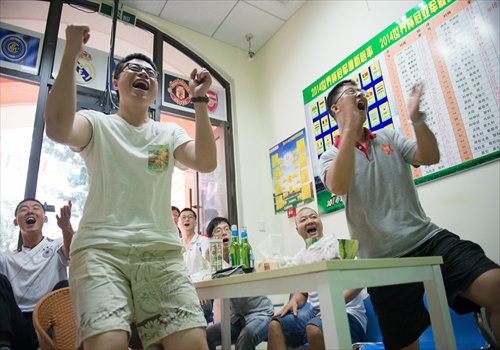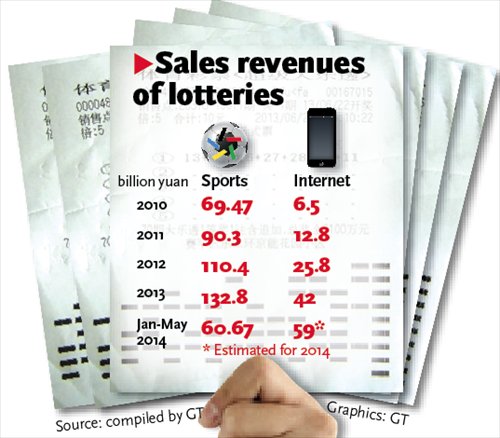HOME >> BUSINESS
Making bucks from betting
By Zhang Ye Source:Global Times Published: 2014-6-15 23:28:01

Buyers of sports lottery cheer the team they bet during a World Cup soccer match in Changxing, East China's Zhejiang Province on Friday. Photo: IC

Sports lotteries of the guessing type in China did brisk business on the first day of the 2014 FIFA World Cup, registering sales of over 150 million yuan ($24 million), said the National Sports Lottery Management Center on Friday.
Sports lotteries of the guessing type, introduced into the Chinese market in 2001, mainly target amateur lottery buyers, who bet on which team will win in a match and what score via PCs and mobile devices as well as with off-line distributors. Those who make right bet win a prize from the organizers at a promised ratio of the revenue.
Sales of such lotteries rise steeply during the World Cup. On the first day of the 2010 World Cup held in South Africa from June 11 to July 12, China recorded 22 million yuan in sales of such lotteries, Guangdong-based Information Times reported in June 2010. That year, the sales hit 6.3 billion yuan as of July 16, close to the figure of 6.6 billion yuan for the whole of 2009, according to the official data.
"The country's lottery sector is set to register a dramatic sales surge during the ongoing World Cup [which opened in Brazil on Thursday (local time)]" Li Zichuan, an industry analyst with Analysys International, told the Global Times on Sunday.
Generally speaking, the lottery sector achieves a 25 to 30 percent yearly growth in sales in World Cup years, which means this year's World Cup will lead to 8.5 billion yuan to 10.2 billion yuan in sales for the whole of 2014, the 21st Century Business Herald reported Friday.
Domestic sales of sports lotteries hit 132.8 billion yuan in 2013, an increase of 20.2 percent year-on-year, and sales in the first five months ending May 2014 stood at 60.67 billion yuan, data from the Ministry of Finance showed.
"At present, I spend 20 yuan on sports lotteries of the guessing type for each soccer match, while without the World Cup, I would usually spend 4 yuan once a year," Xiao Yi, a Beijing-based white-collar worker, told the Global Times on Sunday.
Xiao usually participates in the lottery using her smartphone, as "not all streets and communities have lottery vendors," she noted.
According to a report issued on Saturday by Internet intelligent agency Sootoo, China's online lottery ticket sales reached 42 billion yuan in 2013, up 62.79 percent year-on-year. Sootoo predicts that this year, the figure hit nearly 60 billion yuan.
Li noted that online lottery ticket sales are booming, driven by dynamic Internet companies such as Alibaba, Tencent and Baidu amid increasingly open market.
In January 2013, the Ministry of Finance issued a statement saying that online lottery sales were permitted after a policy issued in 2008 prohibited such activities.
The sports lotteries of the guessing type are designed and organized either by the National Sports Lottery Management Center or lottery bureaus of various cities, and Internet companies and off-line distributors cannot change the prize ratio, which makes the lottery sector easy to regulate, remarked Li.
Despite strict rules, there are still many kinds of illegal soccer gambling activities run by individuals, and many professional lottery-buyers choose to participate in such activities around the big sporting events like the World Cup to chase bigger prizes, a Beijing-based industry insider told the Global Times Sunday.
While official sports lotteries of the guessing type offer 80 percent of the sales revenue as prize money, people can get 88 to 90 percent of the revenue in the illegal gambling market, the insider said.
"Illegal gambling can bring people high returns, but can also lead to sudden losses," said Li, noting people should stay away from it.
The Ministry of Public Security has ordered local bureaus to strengthen crackdown on illegal sports gambling during the ongoing World Cup, according to the Xinhua News Agency on Sunday.
Newspaper headline: World Cup drives sales of sports lotteries
Posted in: Industries